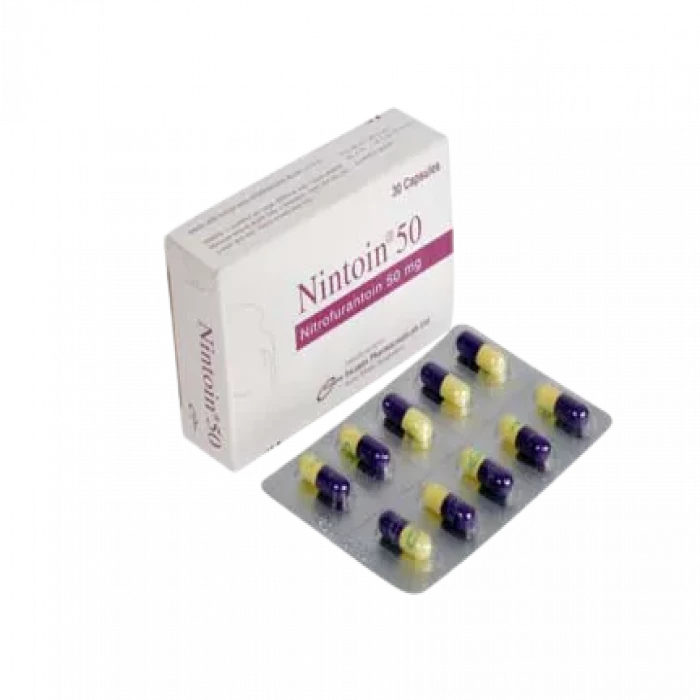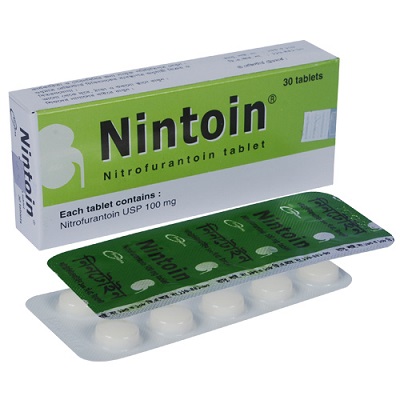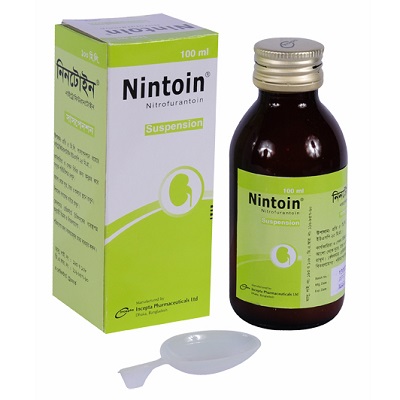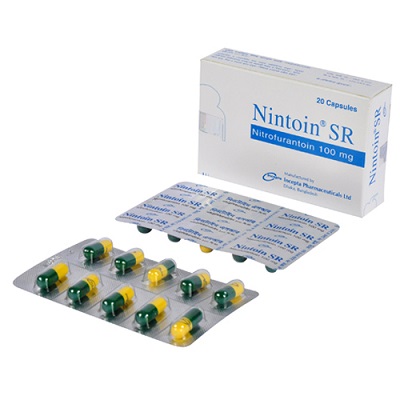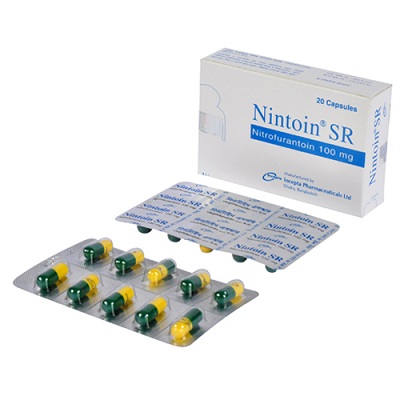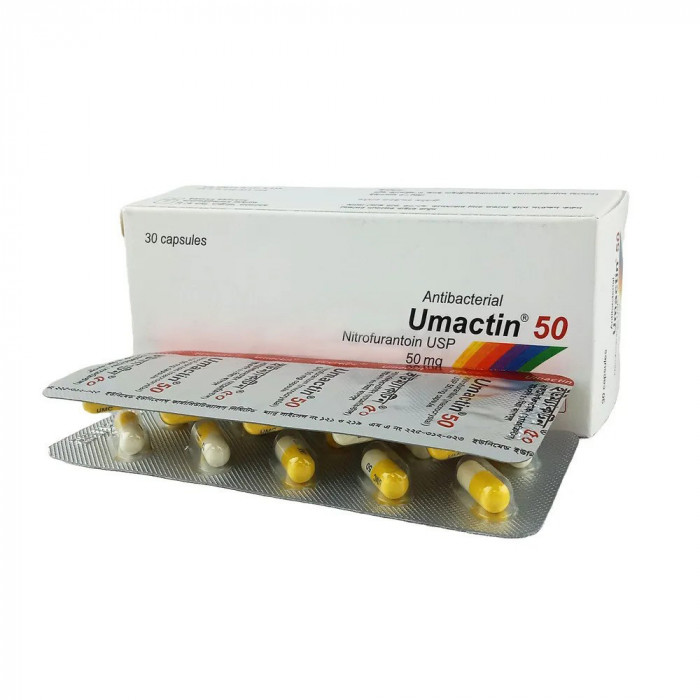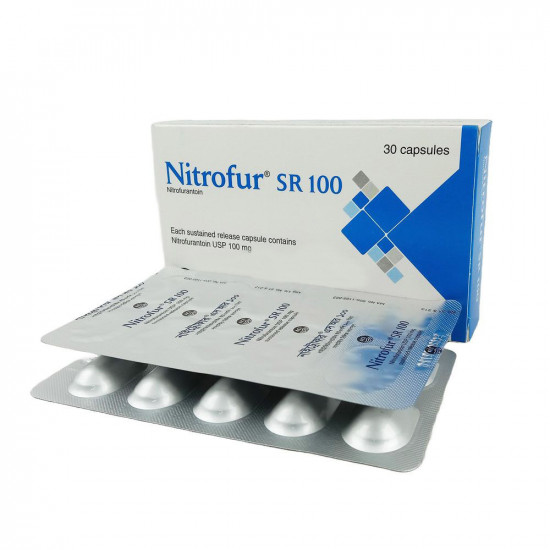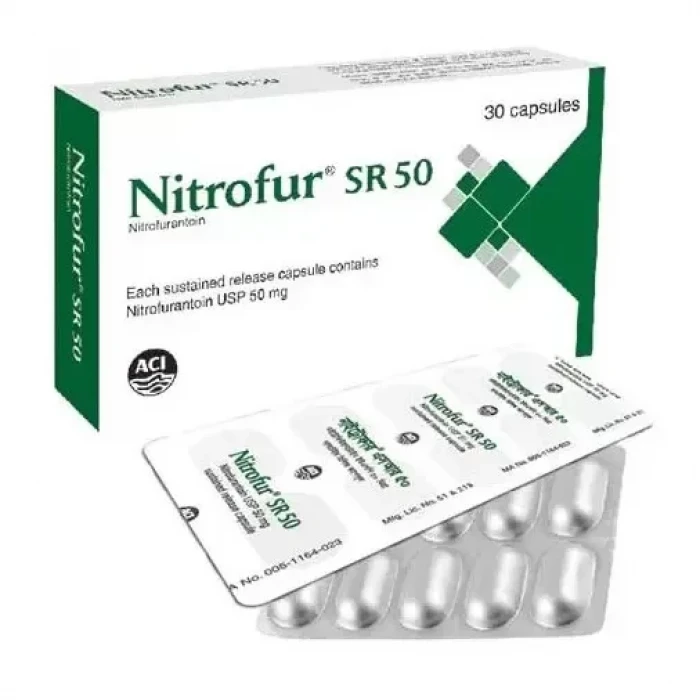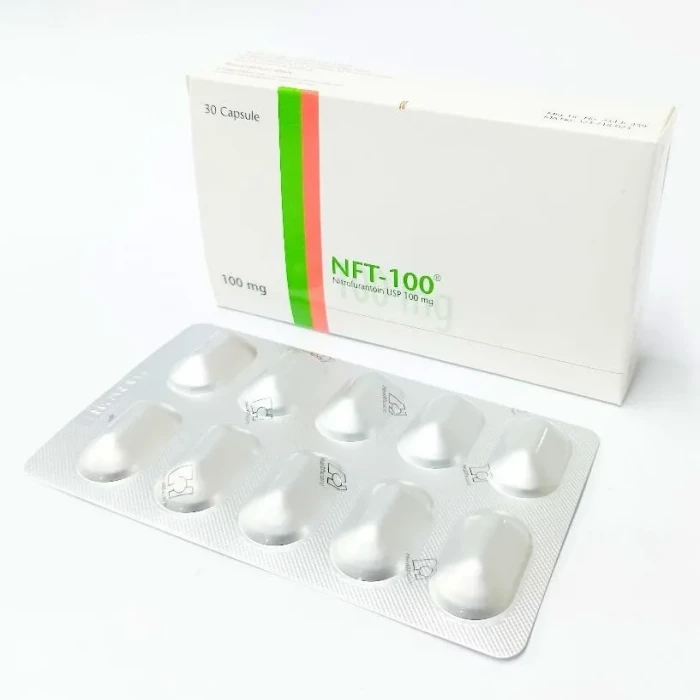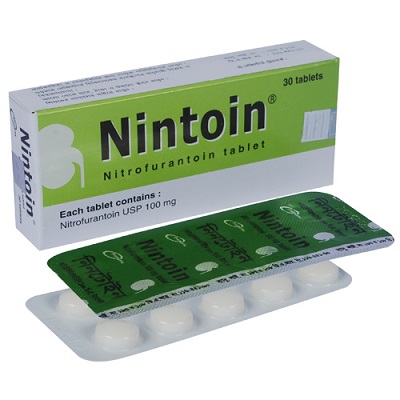
✔ 100% Authentic Product
👁️ Currently Viewing 6107
Nintoin 100mg Tablet 10pcs
Nintoin 100mg Tablet (Nitrofurantoin) is a bactericidal antibiotic that helps to treat or prevent urinary tract infections. It should be used with caution in patients with kidney disease.
Discount
Price: ৳ 65
MRP:
৳
68
5%
Off

100% Genuine Products, Guaranteed

Safe & Secure Payments, Always

Fast, Secure & Efficient Delivery

Proper Packaging
 Cash on Delivery - All over Bangladesh
Cash on Delivery - All over Bangladesh Regular Delivery - 12-24 Hours, Dhaka City* Charge Tk.39-59
Regular Delivery - 12-24 Hours, Dhaka City* Charge Tk.39-59 Regular Delivery - 24-48 Hours, Other Cities* Charge Tk.99-110
Regular Delivery - 24-48 Hours, Other Cities* Charge Tk.99-110
🌙 রমযান অফার 🌙
 ফ্রি ডেলিভারিঃ - ৭৯৯ টাকা+ অর্ডারে, ঢাকা
শহরে
ফ্রি ডেলিভারিঃ - ৭৯৯ টাকা+ অর্ডারে, ঢাকা
শহরে ফ্রি ডেলিভারিঃ - ২৭৯৯ টাকা+ অর্ডারে, ঢাকার
বাহিরে
ফ্রি ডেলিভারিঃ - ২৭৯৯ টাকা+ অর্ডারে, ঢাকার
বাহিরে
📲 মোবাইল অ্যাপ অর্ডারে সাশ্রয় বেশী
-
Google Play Store থেকে ডাউনলোড
-
Apple Store থেকে ডাউনলোড
100% Genuine Products, Guaranteed
Safe & Secure Payments, Always
Fast, Secure & Efficient Delivery
Proper Packaging
 Cash on Delivery - All over Bangladesh
Cash on Delivery - All over Bangladesh Regular Delivery - 12-24 Hours, Dhaka City* Charge Tk.39-59
Regular Delivery - 12-24 Hours, Dhaka City* Charge Tk.39-59 Regular Delivery - 24-48 Hours, Other Cities* Charge Tk.99-110
Regular Delivery - 24-48 Hours, Other Cities* Charge Tk.99-110 ফ্রি ডেলিভারিঃ - ৭৯৯ টাকা+ অর্ডারে, ঢাকা
শহরে
ফ্রি ডেলিভারিঃ - ৭৯৯ টাকা+ অর্ডারে, ঢাকা
শহরে ফ্রি ডেলিভারিঃ - ২৭৯৯ টাকা+ অর্ডারে, ঢাকার
বাহিরে
ফ্রি ডেলিভারিঃ - ২৭৯৯ টাকা+ অর্ডারে, ঢাকার
বাহিরে- Google Play Store থেকে ডাউনলোড
- Apple Store থেকে ডাউনলোড
🌙 রমযান অফার 🌙
📲 মোবাইল অ্যাপ অর্ডারে সাশ্রয় বেশী
✅ Description:
Nintoin 100mg Tablet contains Nitrofurantoin, which is an antibiotic used to treat and prevent urinary tract infections (UTIs). UTIs can occur in various parts of the urinary system, including the bladder, kidneys, ureters, and urethra. Common symptoms of UTIs include a strong urge to urinate, a burning sensation while urinating, decreased urine flow, cloudy urine, blood in urine, and pelvic pain (more commonly in women).
Your doctor will monitor the functioning of your lungs and liver regularly while you are taking Nintoin 100mg Tablet. It is important to note that this medication may interfere with urine tests for sugar, potentially leading to a false positive result.
Caution should be exercised when taking Nintoin 100mg Tablet in patients with lung or liver disease, anemia, diabetes (high blood sugar), conditions causing severe weakness, electrolyte imbalance, vitamin B deficiency, and severe kidney disease.
The use of Nintoin 100mg Tablet is not recommended in pregnant women during labor or delivery due to potential harm to the baby. It should be used with caution in breastfeeding women.
This medication should be avoided in infants below 3 months of age and used with caution in elderly patients.
The most common side effects of Nintoin 100mg Tablet include nausea, vomiting, loss of appetite, and diarrhea. If any of these side effects worsen, it is important to consult your doctor.
It is advisable to consult with a healthcare professional for personalized guidance and to address any concerns regarding the use of Nintoin 100mg Tablet.
Safety Advices

Alcohol
UNSAFE
Avoid consumption of alcohol while taking Nintoin 100mg Tablet because it might make you dizzier.

Pregnancy
CONSULT YOUR DOCTOR
Nintoin 100mg Tablet can be used during pregnancy only if prescribed by your doctor. It should, however, not be used at this stage of pregnancy (during labor or delivery) as it may harm the unborn baby. It is essential to always consult a doctor before starting any medicine during pregnancy.

Breastfeeding
CONSULT YOUR DOCTOR
As Nintoin 100mg Tablet is known to pass into breast milk, you should consult your doctor before using this medicine during breastfeeding.

Driving
CAUTION
Nintoin 100mg Tablet may cause dizziness and drowsiness, hence you need to be cautious while driving.

Kidney
CONSULT YOUR DOCTOR
Nintoin 100mg Tablet is not recommended for use in patients with kidney disease that severely affects the function of the kidneys. It should be used with caution in patients with kidney problems. Consult your doctor before taking Nintoin 100mg Tablet.

Liver
CONSULT YOUR DOCTOR
Nintoin 100mg Tablet should be taken with caution in patients with liver disease. Consult your doctor before taking Nintoin 100mg Tablet.
✔️ Uses of Nintoin 100mg Tablet
- Treatment or prevention of urinary tract infections caused by Escherichia coli, Staphylococcus aureus, Enterococci, Citrobacter, etc.
✔️ How does Nintoin 100mg Tablet work?
Nintoin 100mg Tablet effectively treats and prevents urinary tract infections by killing bacteria present in the urethra, bladder, and/or kidneys. It mainly acts by disrupting the production of genetic material present in the bacterial cell.
✔️ Side Effects of Nintoin 100mg Tablet
- Skin rash
- Fever and chills
- Burning or tingling sensation
- Headache
- Drowsiness
- Diarrhea
- Excessive gas in the stomach
- Acute pulmonary reaction syndrome (sudden onset of fever, chills, cough, body pain, and shortness of breath)
- Sub-acute pulmonary reactions (persistent dry cough, shortness of breath, and fever)
- Chronic pulmonary reaction (gradual onset of persistent dry cough and shortness of breath)
✔️ Quick Suggestions:
Nintoin 100mg Tablet is prescribed for the treatment and prevention of uncomplicated urinary tract infections. Here are some important points to remember when taking this medication:
- Follow Prescription: Take Nintoin 100mg Tablet exactly as prescribed by your doctor. Do not exceed or reduce the recommended dose unless instructed by your doctor.
- Missed Dose: If you forget to take a dose, take it as soon as you remember. However, if it is almost time for your next dose, skip the missed dose and continue with your regular dosing schedule. Do not double the dose to make up for the missed one.
- Pregnancy and Breastfeeding: Nintoin 100mg Tablet is not recommended if you are pregnant, planning to become pregnant, or breastfeeding. This medication can potentially harm your baby. If you become pregnant while taking this medication, stop taking it immediately and consult your doctor.
- Medication Interactions: Inform your doctor about all other medications you are taking, including over-the-counter drugs, supplements, or herbal products. This will help prevent any potential drug interactions.
- Side Effects: Some common side effects of Nintoin 100mg Tablet include headache, stomach discomfort, skin rash, nausea, and vomiting. If these side effects bother you or persist, inform your doctor.
- Dizziness and Sleepiness: If you experience dizziness or sleepiness after taking this tablet, it is advisable to avoid activities such as driving, operating heavy machinery, or tasks that require mental alertness.
✔️ Indication of Nintoin 100mg Tablet
Nintoin 100mg Tablet is an antibiotic medicine. It is used for the treatment and prevention of uncomplicated urinary tract infections.
✔️ Pharmacology
Nitrofurantoin is an antibacterial agent primarily used for the treatment of urinary tract infections. It is highly soluble in urine and may impart a brown color to it. Nitrofurantoin works by inactivating or altering bacterial ribosomal proteins and other macromolecules. It has demonstrated activity against the following bacteria:
Gram-Positive Aerobes:
- Staphylococcus saprophyticus
- Coagulase-negative staphylococci (including Staphylococcus epidermidis)
- Enterococcus faecalis
- Staphylococcus aureus
- Streptococcus agalactiae
- Group D streptococci
- Viridans group streptococci
Gram-Negative Aerobes:
- Escherichia coli
- Citrobacter amalonaticus
- Citrobacter diversus
- Citrobacter freundii
- Klebsiella oxytoca
- Klebsiella ozaenae
These bacteria are commonly associated with urinary tract infections. Nitrofurantoin's mechanism of action and spectrum of activity makes it an effective treatment option for these infections. It is important to note that the susceptibility of bacteria to nitrofurantoin may vary, and it is always advisable to consult a healthcare professional for appropriate diagnosis and treatment recommendations.
✔️ Dosage & Administration of Nintoin 100mg Tablet
- For adults, the recommended dosage of Nitrofurantoin tablets for uncomplicated urinary tract infections is 50-100 mg taken four times a day. It is generally recommended to start with a lower dosage level. The duration of therapy should be one week or at least 3 days after achieving sterility of the urine.
- In cases where long-term suppressive therapy is required, the dosage can be reduced to 50-100 mg taken at bedtime.
Take Nintoin 100mg Tablet as advised by your physician. Swallow Nintoin 100mg Tablet with a glass of water and do not crush or chew it. Nintoin 100mg Tablet should always be taken with food or milk for effective working and to avoid stomach upset. It's important to note that these dosage recommendations are general guidelines and may vary depending on individual factors and the specific instructions provided by your healthcare provider. Always follow your doctor's instructions regarding the dosage and duration of Nitrofurantoin treatment.
✔️ Interaction
When Nitrofurantoin is taken together with antacids containing Magnesium Trisilicate, it can interfere with the absorption and effectiveness of certain uricosuric medicines, such as Probenecid and Sulfinpyrazone. Uricosuric medicines are used to treat conditions like gout by increasing the excretion of uric acid from the body.
The presence of Magnesium Trisilicate in antacids can reduce the absorption rate and extent of these uricosuric medicines, making them less effective in lowering uric acid levels. Additionally, Nitrofurantoin can also be affected by the interaction with Magnesium Trisilicate, as it can limit the secretion of Nitrofurantoin in the renal tubules (part of the kidney involved in urine formation and excretion).
To ensure the optimal effectiveness of both Nitrofurantoin and uricosuric medicines, it is advisable to separate their administration. It is recommended to take Nitrofurantoin and uricosuric medicines at different times, with an appropriate time interval between them. This helps to avoid any potential interactions and allows for proper absorption and effectiveness of each medication.
✔️ Contraindications
Severe Renal Impairment: If you have severe renal impairment, such as anuria (absence of urine production), oliguria (reduced urine production), significantly elevated serum creatinine levels, or creatinine clearance (CrCl) below 60 ml/min, the use of nitrofurantoin may be contraindicated or require dosage adjustment. Your healthcare provider will determine the appropriate course of action.
Hypersensitivity to Nitrofurans: If you have a known hypersensitivity or allergic reaction to nitrofurans or any components of nitrofurantoin, its use should be avoided. Allergic reactions can range from mild skin rashes to severe systemic reactions, including anaphylaxis.
G6PD Deficiency: Nitrofurantoin use should be avoided in individuals with glucose-6-phosphate dehydrogenase (G6PD) deficiency. G6PD deficiency is an enzyme deficiency that can lead to hemolysis (destruction of red blood cells) when exposed to certain medications, including nitrofurantoin.
Infants Under 3 Months of Age: Nitrofurantoin is not recommended for use in infants younger than 3 months old. Safety and efficacy data in this age group are limited.
Pregnancy at Term, During Labor and Delivery, or Imminent Onset of Labor: Nitrofurantoin should not be used in pregnant women at term (near the end of pregnancy), during labor and delivery, or when the onset of labor is imminent. There is a potential risk to the baby during these stages.
✔️ Pregnancy & Lactation
Pregnancy Category B. Limited and inconclusive studies have been conducted on the use of this medication in pregnant women. It should only be used during pregnancy if it is absolutely necessary. Small amounts of nitrofurantoin have been detected in human breast milk. Considering the potential for significant side effects in nursing infants under one month old, a decision should be made regarding whether to discontinue breastfeeding or discontinue the medication, taking into account the importance of the drug to the mother.
✔️ Precautions & Warnings
- In elderly patients, caution should be exercised when using Nitrofurantoin. It is important to monitor hepatic (related to the liver) and pulmonary (related to the lungs) function during prolonged therapy to ensure the medication is well-tolerated and does not cause any adverse effects.
- If a patient has pre-existing pulmonary, hepatic, neurological, or allergic disorders or a predisposition to peripheral neuropathy (damage to the nerves in the extremities), special care should be taken when considering the use of Nitrofurantoin. This includes individuals with conditions such as renal impairment (kidney dysfunction), anemia, diabetes mellitus (high blood sugar), electrolyte imbalance, debility (weakness), and vitamin B deficiency.
- If signs of peripheral neuropathy, such as numbness, tingling, or pain in the hands or feet, occur during treatment with Nitrofurantoin, the medication should be discontinued.
- Regarding lactation, Nitrofurantoin enters breast milk. Therefore, it is recommended to discontinue the drug or avoid nursing while taking Nitrofurantoin to prevent potentially adverse effects on the breastfed infant.
✔️ Storage Conditions
Do not store above 30°C. Keep away from light and out of the reach of children.
⚠️Disclaimer:
At ePharma, we’re committed to providing accurate and accessible health information. However, all content is intended for informational purposes only and should not replace medical advice from a qualified physician. Please consult your healthcare provider for personalized guidance. We aim to support, not substitute, the doctor-patient relationship.




